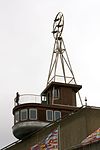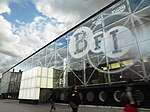Purcell Room

The Purcell Room is a concert and performance venue which forms part of the Southbank Centre, one of central London's leading cultural complexes. It is named after the 17th century English composer Henry Purcell and has 370 seats. The Purcell Room has hosted a wide range of chamber music, jazz, mime and poetry recitals. In the context of the Southbank Centre it is the smallest of a set of three venues, the other two being the Royal Festival Hall, a large symphony hall, and the QEH, which is used for orchestral, chamber and contemporary amplified music. The Purcell Room was built at the same time as the QEH, with which it shared a common foyer building and architectural features as an example of Brutalist architecture. The focus of the building is its interior space and it makes few concessions to external decoration. From outside, even its position within Southbank Centre is not easy to discern. The QEH and Purcell Room were designed, with The Hayward, as additions to the Southbank Centre arts complex by Hubert Bennett, head of the architects department of the Greater London Council, with Jack Whittle, F.G West and Geoffrey Horsefall. The venue was temporarily closed in September 2015, for major renovations, and re-opened in 2018.
Excerpt from the Wikipedia article Purcell Room (License: CC BY-SA 3.0, Authors, Images).Purcell Room
Belvedere Road, London Lambeth (London Borough of Lambeth)
Geographical coordinates (GPS) Address Nearby Places Show on map
Geographical coordinates (GPS)
| Latitude | Longitude |
|---|---|
| N 51.5065 ° | E -0.1159 ° |
Address
Southbank Centre
Belvedere Road
SE1 7NA London, Lambeth (London Borough of Lambeth)
England, United Kingdom
Open on Google Maps









